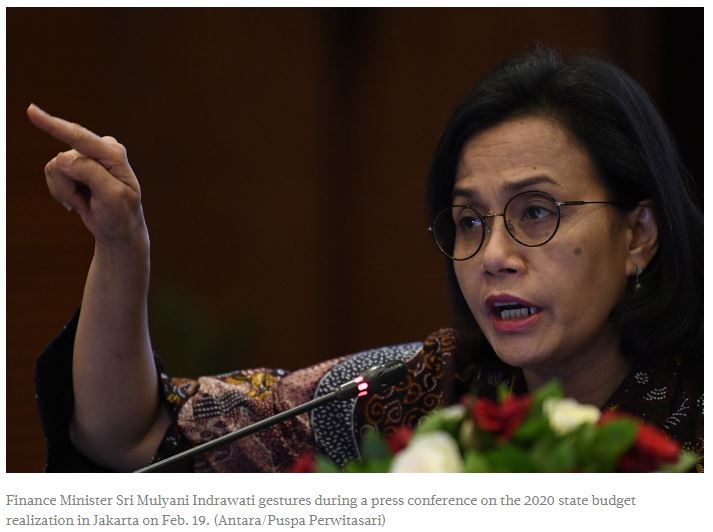Indonesia: Weak state revenue reflects ‘fragile’ economic recovery: Sri Mulyani
Indonesia’s economic recovery is “fragile” as state revenue weakened in July after an improvement recorded in the previous month, Finance Minister Sri Mulyani Indrawati said on Tuesday, warning that the country may enter recession in the third quarter.
State revenue collection improved in June compared with May following the government’s decision to ease large scale social restrictions (PSBB), which had been implemented to curb the spread of COVID-19, but tax income from several business sectors fell again in July, she said.
“Indonesia’s economic recovery is not solid and remains very fragile,” she told a livestreamed press briefing on the 2020 state budget realization. “The COVID-19 pandemic is the main factor that determined economic activity and recovery. We saw that recovery continued in July but there are signs the economy is still fragile.”
The government expects the economy to further shrink by 2 percent at worst or record zero percent growth at best in the third quarter, she went on to say, adding that the key to recovery would be stronger consumer spending and investment.
Indonesia’s economy shrank 5.32 percent in the second quarter, the first decline since 1999, as all components of the economy but net exports fell significantly due to the coronavirus-induced restrictions. A further contraction in the third quarter would put Indonesia into a recession, which is defined by economic contraction in two consecutive quarters.
The government collected Rp 922.2 trillion (US$62.79 billion) in state revenue as of July – down by 12.4 percent year-on-year (yoy) and about 54 percent from this year’s target – following drops in tax revenue and nontax income, among other things, Finance Ministry data show.
Tax collection, which accounts for a majority of the state income, fell deeper by 14.7 percent annually in July compared to a 12 percent contraction in June. On a month-on-month (mom) basis, tax income grew 13.2 percent in July to Rp 601.9 trillion versus 19.6 percent growth in June.
Several business sectors including trade, construction and real estate, as well as mining fell at a faster rate in July compared with June, signaling a slowing economic recovery, the finance minister said. Tax income from the oil and gas industry also fell significantly because of a drop in commodity prices.
Meanwhile, state expenditure rose by 1.3 percent yoy to Rp 1.25 quadrillion as of July, about 45.7 percent of this year’s target, as the government increased social aid and stimulus spending.
The government has spent only 25.1 percent of the Rp 695.2 trillion COVID-19 stimulus in the five months since the start of the outbreak.
“We will redesign the poorly disbursed programs so that the stimulus can be more effective,” Sri Mulyani added.
“The use of the state budget will be maximized including by providing tax incentives or boosting social spending, among other measures, to boost people’s spending and to restore investment,” she said. “We will monitor and improve economic recovery-related spending to make the recovery more stable and resilient.”
The slight increase in expenditure and the fall in state revenue resulted in a budget deficit of Rp 330.2 trillion, 2.01 percent of gross domestic product (GDP), an increase of 79.5 percent compared with the same period last year but still below this year’s target of 6.34 percent of GDP.
Danny Darussalam Tax Center (DDTC) research partner Bawono Kristiaji said the slowing economic activity would continue to hit tax income from several business sectors, namely manufacturing, trade and mining, he said, adding that the weak consumer spending and international trade would also reduce income from value-added tax and import tax.
“Those factors, along with the government’s tax incentives that will boost tax expenditure, will determine this year’s tax income,” Bawono told The Jakarta Post on Tuesday, expecting around a 10 to 14 percent contraction in tax income this year, in line with the government’s target.
“The government’s 2021 tax income target of 5.8 percent growth signaled that they are being realistic as income from taxes may not fully recover by next year.”
Despite indicators showing a rebound in the purchasing managers index, retail sales and the consumer confidence index, among other indicators, the economic recovery is at risk of losing momentum because of weak demand, said Kebangsaan University economist Eric Sugandi.
“A full economic recovery will depend on whether or not the demand side can recover sustainably in the coming months,” he told the Post. “The finance minister’s statement indicates they are being careful as tax revenue may not reach its baseline target.”
The key to lessening the coronavirus-induced economic pain would be to expedite the government’s stimulus spending, he went on to say, adding that the disbursement of fiscal and monetary stimulus programs would be crucial in supporting economic recovery.
Source: https://www.thejakartapost.com/news/2020/08/25/weak-state-revenue-reflects-fragile-economic-recovery-sri-mulyani.html


 English
English




